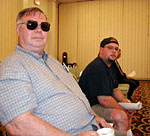By Andrew Haeg
Minnesota Public Radio
July 1, 2002
The federal government is holding a job fair this week for federal screeners at the Twin Cities Airport. The government will eventually employ more than 1,000 screeners and administrators at the airport as it takes over security from the airlines.
| |
|
|
|
||
The Custards were a flying family. Father Dwayne used to work for an airline, and since birth his kids have traveled extensively. Now Dwayne Custard and his son Brent, 23, want to work at the airport. So they came to the job fair in Bloomington to apply.
Brent Custard currently works in a warehouse. He likes the bustle of the airport and working with people, so a job as a federal airport screener seemed a good fit.
"You never know what's going to happen," Custard says. "It's just fun; you meet new people, you're not just sitting around a desk all the time."
Dwayne Custard retired in January from a job with an airline. He missed working at the airport, but he also thinks he would be doing important work as a federal screener by ensuring safety in the air. "For me, it's a job that needs to be done," he says. "And I know I'd enjoy that kind of a job; I've been through this before."
Leo Neidorf, 82, does not have to work, but he does not want to sit around collecting his pension. So he attended the job fair to find a job to keep him busy.
"It keeps me younger, and I enjoy it, and I have to get up and go to work instead of laying in bed. And it gives me a little extra change," he said.
The Custards and Niedorf, if hired, will be three of the 1,000 or so federal employees who will run security screening at the Twin Cities airport.
The jobs are a result of a congressional ruling last November, which put the government in charge of airport security starting this coming Nov. 19.
| |
|
|
|
||
Ken Kasprisin, federal security director for the Twin Cities Airport, says he has two goals. "One, is we're going to secure the skies over America," Kasprisin says. "We are not going to allow anything to go through this airport that's going to be a threat to this country. The second, is we're going to focus on customer service to ensure that we treat people with dignity and respect, that we expedite as much as much as possible, without jeopardizing the security aspects," he says.
The government took control of airport security after Sept. 11 in part because of concerns that airlines focused less on security and more on getting passengers to their gates as quickly as possible.
Kasprisin says he think the federal system will be a big improvement. But he says it's not his intention to make security so tight that passengers won't want to fly for the hassle.
"We can lock this place down, ensure that there's 100-percent screening," Kasprisin says. "But we'll destroy the airlines. There's got to be a good balance there, and we'll work at that."
Work as an airport screener may be somewhat monotonous. Workers have to watch X-ray monitors closely to inspect carry-on bags and cargo. They'll also have to check luggage by hand. And they'll have to contend with impatient passengers. And while the pay is better than screeners got with the airlines, it's not incredible, ranging from $23,000 and $35,000 plus benefits.
The new federal screener positions will help absorb some of the thousands of Minnesotans who have lost their jobs over the past several months as the economy sputtered.
Pat Griffin recently lost her job at Imation, a St. Paul-based technology company. Now she's applying for a job as a screener, partly just to find a job, but also because she likes the idea of serving the country.
"I'm excited," she says. "I think it would be good to do something for the country, seeing as I've never been in the service."
The federal government will hire a total of 50,000 and baggage screeners and supervisors nationwide. The job fair runs through Tuesday evening at the Minneapolis Airport Hilton in Bloomington.
More Information

